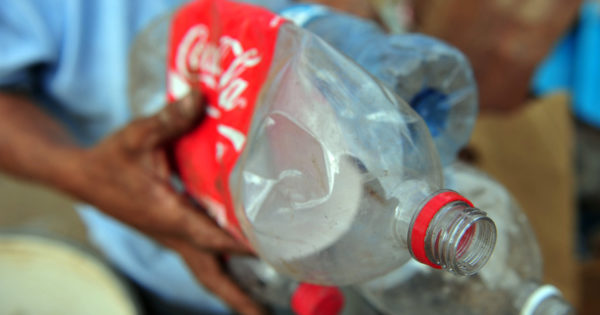
“I’d Like to Buy the World a Coke” is among Coca-Cola’s most famous slogans, but all those plastic bottles have added up to make the soft-drink company the world’s top plastic polluter for the second year in a row.
That’s according to a waste audit organized by the environmental group Break Free From Plastic, an organization that advocates for a plastic-free future. Over 72,000 volunteers in 51 countries removed and catalogued more than 476,435 pieces of plastic waste across the world’s streets, public parks and beaches. Of that waste, 43% was clearly identifiable as belonging to some 8,000 consumer brands.
The audit found that Coca-Cola—the world’s largest non-alcoholic beverage company with 500 brands under its umbrella—was responsible for 11,732 pieces of plastic waste recovered in 37 countries across four continents, more than the next three polluters combined. Nestlé and PepsiCo rounded out the top three, accounting for 4,846 pieces of plastic in 31 countries, and 3,362 pieces in 28 countries, respectively.
“Anytime our packaging ends up in our oceans, or anywhere that it doesn’t belong, is unacceptable to us,” a Coca-Cola representative said in a statement to Adweek. “We are working to address this critical global issue, both to help turn off the tap in terms of plastic waste entering our oceans and to help clean up the existing pollution.”
For its part, Coca-Cola did introduce a new bottle made with 25% recycled ocean debris earlier this month. The rep added that the brand intends to recover “100% of the cans and bottles we use by 2030” and to make its bottles and cans with 50% recycled content and make its packaging fully recyclable by 2025.
But overall, while industry leaders like to tell consumers they’re more concerned about stakeholders than shareholders, the findings show that brands—particularly American consumer brands—still have a lot of work to do.
Making the environment part of the bottom line
Coca-Cola is not alone in introducing sustainability-minded initiatives. In the travel industry, brands from hotels to cruise ships have started ditching single-use plastics in the name of sustainability. Even companies whose products are not meant to be disposable, like Google and computer maker HP, are making strides in incorporating recycled materials into their supply lines.
Going sustainable is not just a marketing trend, either. In survey of future marketing trends by consulting firm Deloitte, over 20% of consumers identify with brands based on a company’s environmental bona fides. More than 80% of consumers would be willing to pay more if a brand “raised its prices to be more environmentally and socially responsible.”
But while all of these various initiatives are “definitely a step in the right direction,” said Sybil Bullock, Break Free From Plastic’s global brand audit coordinator. “But unfortunately, a lot of this ends up being another form of greenwashing.”
Reducing plastic use doesn’t get at the root of the issue: Recycling remains a major challenge and plastics, which make up 10% of the fossil fuel industry according to Break Free From Plastic, do long-lasting harm to the environment.
“These products are still showing up in places they shouldn’t,” Bullock said. “They have the money, they have the developers and the industry specialists. They have everything they need to put their money where their mouth is to develop less polluting systems.”
What the top plastic polluters are doing
In the United States, Nestlé, the Solo Cup Company and Starbucks accounted for Break Free From Plastic’s top polluting brands. In Europe, it was Coca-Cola, PepsiCo. and Heineken. Coca-Cola and PepsiCo were also among the top three worst polluters in South America, Asia and Europe.
“The latest #BreakFreeFromPlastic report highlights the continued challenges we face as a society, in tackling the issue of packaging and plastic waste,” said Nestlé in a statement. “It is completely unacceptable for that packaging to end up as litter in the environment, and we are working hard to make all of our packaging either recyclable or reusable by 2025.”
https://www.adweek.com/brand-marketing/worst-plastic-polluters-coca-cola-pepsico-environmental-waste/

